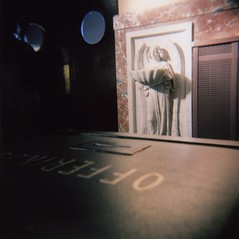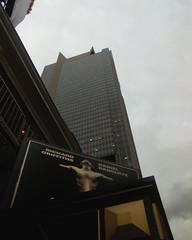Divorce is most of all lonely.
Mine was compounded by the fact that my family adored my ex- and, for whatever reason -- maybe because the realization that the happy shining life that I loved so much was, in part, a sham -- I didn’t share a lot of details with them about why we were getting divorced. Protecting him and myself, I guess. But the event largely proceeded in silence. My silence. They didn’t ask much, and I didn’t tell them much.
Which made for a very lonely time in which I settled into the understanding that everything I wished for was gone.
It all exploded (many years ago, now) around Thanksgiving and had settled some by Christmas, but I was feeling so raw that I declined invitations from family and friends and opted to spend my Christmas at home alone by myself.
I don’t recommend it. But it gave me plenty of room to cry. And feel lost and alone and as if my world had ended.
Right. Like I said. Don’t recommend it.
A few days after Christmas I received a package from my little brother. I felt I had disappointed my brothers most of all. I gave them the news indirectly, cc’ing them on an email that I sent to my father as a last minute impulse. They had a great relationship with my ex- -- he was like a brother, he fit my family so well -- and it was the wrong wrong wrong way to do it. But hurt skews your best rational impulses, and regret doesn’t mean you can take it back.
So I received a late Christmas package from my little brother. The late part made sense: as a clan we seem to share a collective phobia of post offices and things always get mailed later than they should. What’s unusual is receiving a gift on time from my family. Late is expected.
I received a slip to pick up the package at the P.O. and so I did, taking it with me next door to the sublime
Espresso Vivace to have a shot of coffee before I headed back up the hill for home. My empty home.
I decided to open his package right there at Vivace, and this little porcelain figurine -- the very first and the very last porcelain figurine that I have ever received from any member of my family -- was in the package. (We are not, as a habit, givers of porcelain figurines.
Plastic, maybe. Under certain circumstances.) Along with a note from my brother.
I saw the figure, read the note and immediately started to cry. Carefully, silently, my chest heaving and my trying to hide it as I sat in that cafe.
I’ve misplaced the note, so I’ll have to paraphrase it here, but first: a backstory.
The whole tribe of us are hams, and as kids we excelled at mounting theatrical productions. My older sister was the ring leader, and I can still mime for you her choreography to Fantasia -- with roles for all four of us -- that grew and took shape over several years of working it. The story line had nothing to do with the real Fantasia -- Fantasia was convenient because we had the LP and a record player -- it was our score.
I’ll spare you the ELO Electric Bump story. But put it on and I’ll bump it for you, without missing a beat.
So. To the fairy godmother.
One of our most spectacular productions took shape over a weekend at my grandparent’s home in Seattle. I think I’ve mentioned before the
levels and layers of that home -- it was made for theater. We had just moved back to the Northwest from Denver, and were staying there with my grandparents who were also putting up some family friends who had a daughter about the same age as my sister and me. We seized the moment to mount a full-scale production of Cinderella, using my grandmother’s spectacular ball gown collection for costuming (my grandfather was grand potentate of the Nile Temple in the 1960s -- which meant she had an amazing ball gown collection).
We dressed Cinderella in blue taffeta -- A, the family friend, played the princess-to-be. My sister reprised her role of
wicked witch (which she played to perfection almost every single Halloween of our childhood) in the role of wicked stepmother. I think my youngest brother A was the prince, and G played miscellaneous roles, including the priest who would ultimately marry the prince and his princess (the bride’s train, btw, was an extended roll of toilet paper that unspooled as she walked down the aisle).
I was the fairy godmother and I chose for my costume a killer sunshine yellow fringed flapper gown. Sleeveless with straight lines and long satiny fringe running in tiers over the whole of that dress. I asked my grandmother about it not too long ago and unfortunately it’s long gone. Although I’m sure it wouldn’t fit me now (we were unusually tall kids and she was diminutive, so we got away with it then), but if I could score it today I’d find myself a ball to go to. That was a gorgeous gown.
If I may say, I played the part of fairy godmother to perfection. It was my best role ever, wholly improvised, and played to uproarious laughter to a house of completely sloshed adults. They loved it. They particularly loved my crowning moment when, having dressed the ragged Cinderella in a flurry of magical accoutrements (G rushed the goods in when I waved my wand -- it was all very well done) the princess asked: “But I have no shoes. What will I wear for shoes?”
I pondered the problem, studied it, and then resolved it in a flourish -- by pulling a pair of stilettos -- our stand-in glass slippers -- out of the top of my dress where I had propped them in anticipation, heels pointing out, like a stuffed bullet bra, against my then quite flat chest. (This was the summer of what would be my 5th grade year.)

The crowd fell apart.
It was my greatest triumph.
It took some time to mop up the mess, but we finally got the audience to settle down and we took the show to its logical conclusion. Flawlessly executed by all. And of course, after it was done, we talked and talked and talked about it. Told the story over and over.
Because that’s what you do when you put on a show with the best players you’ll ever perform with; when you’re perfectly in synch in a way that only folks who love each other unthinkingly can be.
And that’s why I cried when I read my brother’s note; my brother who felt so far from me just then, who I thought I had lost by making a hugely difficult decision. My brother said in effect: “Merry Christmas to my sister, the best fairy godmother ever.” And some more stuff about being the best sister ever.
Reminding me all at once that I was loved.
And reminding me of something every girl needs to know: that I was my own fairy godmother. That I held the power to make all my wishes come true.
Update: I asked my brothers to verify whether I got their roles right in our world famous production of Cinderella. A couldn't remember for sure (he was so young) but G had no doubt that I mistakenly swapped them -- he was the prince for sure, because
he got to dance with the
princess. So please consider this amendment.
A also reminded me that he was on the phone with my brother when my infamous cc' came across the wires, and G said: "Oh: I just got an email from D." To which A said: "Hey: me too." Thinking it was Thanksgiving greetings they opened it together and both went: "ohhhhhhhhh noooo." The best part is that they laugh about the timing of it today -- these are the kinds of things we laugh about in our family. 'Cause baby, if you lose your lose your laugh you lose your footing. (Ken Kesey said that first.)





















